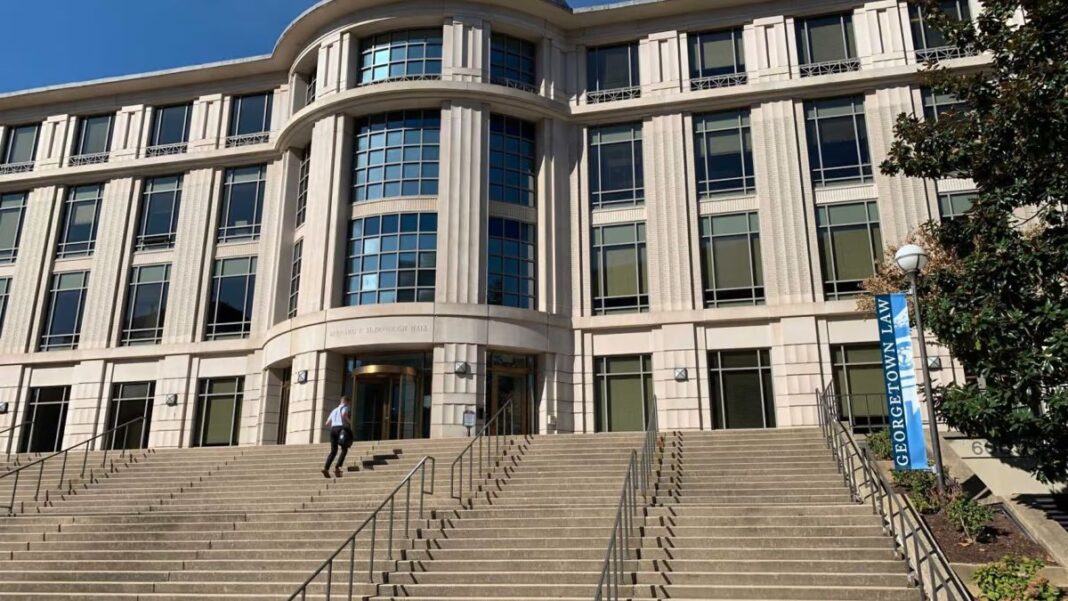Last month, I published (below) my experience at Georgetown Law. For questioning Covid policies, administrators suspended me from campus, forced me to undergo a psychiatric evaluation, required me to waive my right to medical confidentiality, and threatened to report me to state bar associations.
I was hesitant to publicize my story for fear that it would appear self-centered. With time, however, I realized the story was not about me; it was about the corruption of an institution and two figures at the center of its rot: Dean of Students Mitch Bailin and Dean Bill Treanor.
My episode was a reflection on Georgetown’s power structure, not administrators’ attitude toward a respiratory virus. Repeatedly, Georgetown Law has been willing to tarnish individuals’ reputations to advance agendas that stand against traditions of free expression and inquiry.
Again and again, we see Trojan horses draped in innocuous and socially fashionable banners. They claim innate virtue under guises of public health, anti-racism, climate change, rainbow coalitions, and Ukrainian flags. At their core, however, they always benefit Leviathan, augmenting the power of corrupt institutions and stripping individuals of their freedoms.
Beyond the Covid hysteria, my three years at Georgetown (2019-2022) exemplified an institutional pattern of the politics of personal destruction, the eradication of free expression, and the mediocrity of Washington administrators.
Covid was a subset of a larger Washington narrative: the subjugation of individuals to the capricious whims of unimpressive bureaucrats. The following stories are meant to provide the context of the ruling class’s abandonment of formerly sacrosanct American principles in favor of an ideology based on power and image. This fosters a culture that rewards misrepresentations and disregards honesty.
My suspension from Georgetown Law was not an anomaly; it was the modus operandi of a university untethered from concerns for free expression, rationality, and veracity.
The stories of Sandra Sellers, Ilya Shapiro, and Susan Deller Ross demonstrate that the culture I discovered was a larger issue than a Covid response.
Read Full Article on BrownStone.org
What Happened at Georgetown Law with Covid?
For questioning Covid restrictions, Georgetown Law suspended me from campus, forced me to undergo a psychiatric evaluation, required me to waive my right to medical confidentiality, and threatened to report me to state bar associations.
The Dean of Students claimed that I posed a “risk to the public health” of the University, but I quickly learned that my crime had been heretical, not medical.
Just before I entered Georgetown Law in August 2019, I watched The Paper Chase, a 1973 film about a first-year Harvard Law student and his experiences with a demanding professor, Charles Kingsfield.
The movie has the standard themes of law school: teaching students how to think, challenging the premises of an argument, differentiating fact patterns to support precedent. Kingsfield’s demands represent the difficulty of law school, and the most important skill is articulate, logic-based communication. “Nobody inhibits you from expressing yourself,” he scolds one student.
“Nobody inhibits you from expressing yourself.”
Two years later, I realized that Georgetown Law had inverted that script. The school fired a professor for commenting on differences in achievement between racial groups, slandered faculty members for deviating from university group-think, and threatened to destroy dissidents. Students banished cabinet officials from campus and demanded censorship of a tenured professor for her work defending women’s rights in Muslim-majority countries.
Unaware of the paradigm shift, I thought it was proper to ask questions about Georgetown’s Covid policies.
In August 2021, Georgetown Law returned to in-person learning after 17 months of virtual learning. The school announced a series of new policies for the school year: there was a vaccine requirement (later to be supplemented with booster mandates), students were required to wear masks on campus, and drinking water was banned in the classroom.
Dean Bill Treanor announced a new anonymous hotline called “Law Compliance” for community members to report dissidents who dared to quench their thirst or free their vaccinated nostrils.
Read Full Article on BrownStone.org
Originally Published on February 19, 2023









